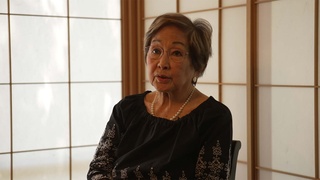Interviews
Pop and Balls
When I was growing up, my father always would say, "You're a girl. You're supposed to get married." You know, and tell my brother, "You got to go to college. You got to do this and that." And I just said, "Me! What about me?" and he would always say, "No, you're a girl. You're a girl." And he does that every time. You know, he's teaching kendo and I said, "I want to do it too" and he says, "No, you're a girl." Everything was... Anyway, one day I came home from school and I had won some class office or whatever and he, he turned to my mother and he said in Japanese, "It's a shame this child does not have kintamas." Do you know what that means? Balls. What he meant is, it's a shame that all these attributes are on a girl child. I heard, that one day when I was charging, I heard that Senator Kennedy turned to a fellow commissioner and said, "Where'd they find that woman? Boy, does she have balls." And so, when I give speeches, I like to say, "Well, my father would be so happy, finally." Yeah.
Date: July 17, 2013
Location: California, US
Interviewer: Sean Hamamoto
Contributed by: Watase Media Arts Center, Japanese American National Museum; Japanese American Bar Association




